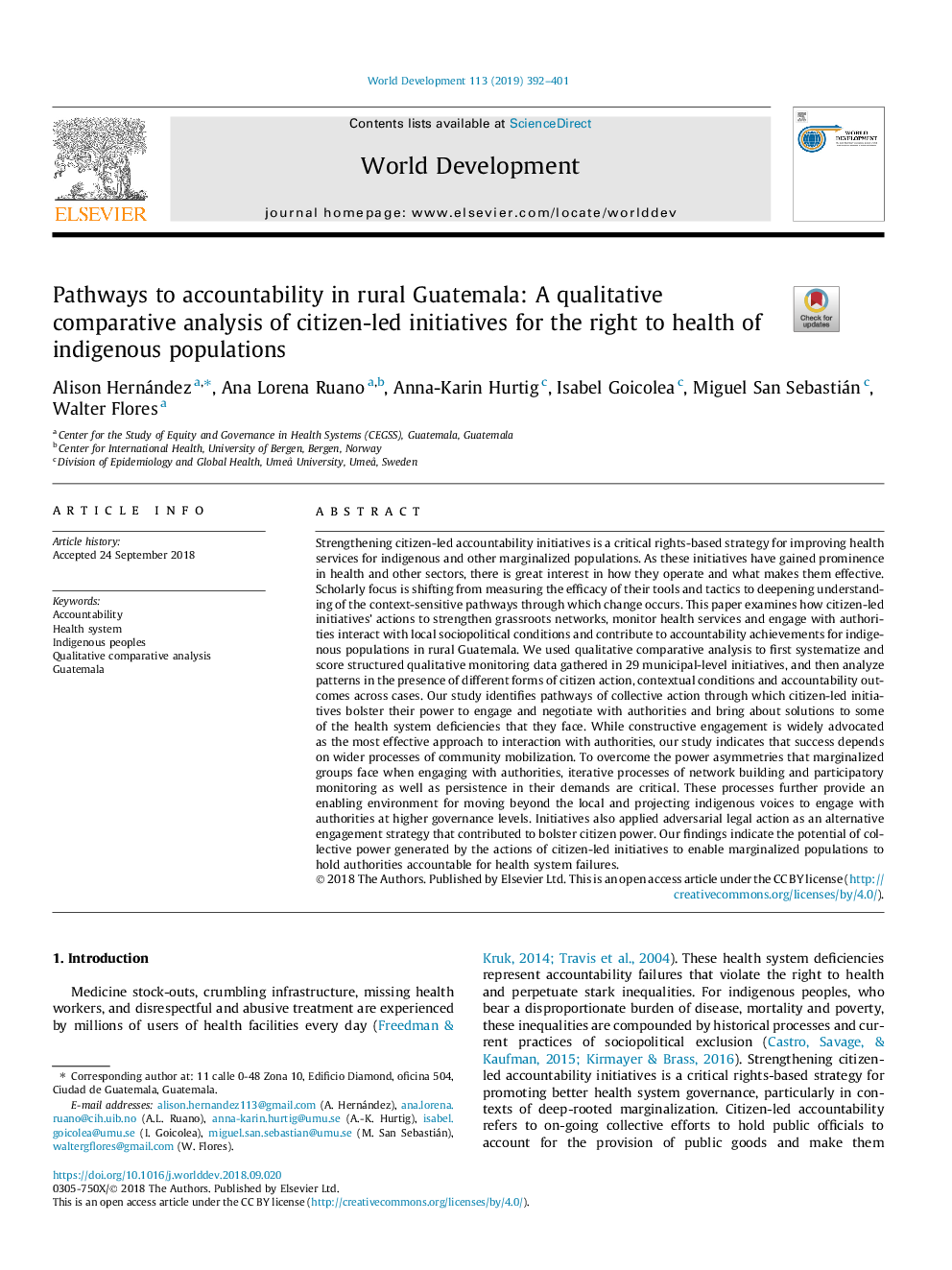| کد مقاله | کد نشریه | سال انتشار | مقاله انگلیسی | نسخه تمام متن |
|---|---|---|---|---|
| 11029774 | 1646444 | 2019 | 10 صفحه PDF | دانلود رایگان |
عنوان انگلیسی مقاله ISI
Pathways to accountability in rural Guatemala: A qualitative comparative analysis of citizen-led initiatives for the right to health of indigenous populations
ترجمه فارسی عنوان
راه های پاسخگویی در گواتمالا روستایی: یک تجزیه و تحلیل تطبیقی کیفی از ابتکارات شهروندی برای حق سلامت مردم بومی
دانلود مقاله + سفارش ترجمه
دانلود مقاله ISI انگلیسی
رایگان برای ایرانیان
کلمات کلیدی
مسئولیت، سیستم سلامت، مردم بومی، تجزیه و تحلیل تطبیقی کیفی، گواتمالا،
ترجمه چکیده
تقویت ابتکارات مسئول پاسخگویی به شهروندان یک استراتژی مبتنی بر حقوق مبتنی بر حقوق برای بهبود خدمات بهداشتی برای جمعیت بومی و دیگر محرومان است. با توجه به این که این ابتکارات در سلامت و دیگر بخش ها برجسته شده است، علاقه ی زیادی به چگونگی عملکرد آنها و کارایی آنها دارد. تمرکز علمی از اندازه گیری اثربخشی ابزار و تاکتیک های آنها به منظور درک مسیر های حساس به متن که از طریق آن تغییر می شود، تغییر می کند. این مقاله به بررسی اقدامات ابتکارات شهروندان برای تقویت شبکه های مردمی، نظارت بر خدمات بهداشتی و تعامل با مقامات با شرایط محلی سیاسی و اجتماعی می پردازد و به دستاوردهای حسابدهی برای جمعیت بومی در گواتمالا روستایی کمک می کند. از تجزیه و تحلیل مقدماتی کیفی برای اولین بار سیستم اطلاعات و داده های نظارت کیهانی ساخت یافته جمع آوری شده در 29 طرح ابتکاری در سطح شهری استفاده شد و سپس الگوهای موجود در حضور اشکال مختلف اقدامات شهروندان، شرایط محیطی و نتایج مسئولیت در موارد مختلف را تجزیه و تحلیل کردیم. مطالعه ما مسیرهایی را برای اقدام جمعی مشخص می کند که از طریق آن ابتکارات شهروندان رهبری قدرت خود را برای مشارکت و مذاکره با مقامات تقویت می کنند و راه حل هایی را برای برخی از نقص های سیستم بهداشتی که با آنها روبرو هستند، به ارمغان می آورد. در حالی که تعامل سازنده به طور گسترده ای به عنوان روشی موثر برای تعامل با مقامات مورد حمایت قرار می گیرد، مطالعه ما نشان می دهد که موفقیت بستگی به فرایندهای گسترده تر بسیج جامعه دارد. برای غلبه بر عدم تقارن قدرت که گروه های حاشیه نشین هنگام برقراری ارتباط با مقامات مواجه می شوند، فرایندهای تکرارپذیری شبکه سازی و نظارت مشارکتی و همچنان پایبندی به خواسته های آنها بسیار مهم است. این فرایندها محیط زیستی را برای فرار از صداهای بومی محلی و برنامه ریزی برای برقراری ارتباط با مقامات در سطوح حاکمیت بالاتر فراهم می کند. ابتکارات همچنین اقدام قانونی محاکمه را به عنوان استراتژی مشارکت جایگزین که به تقویت قدرت شهروندی کمک می کرد، اعمال کرد. یافته های ما نشان می دهد که پتانسیل قدرت جمعی تولید شده توسط اقدامات ابتکاری که توسط شهروندان هدایت می شود تا جمعیت های حاشیه نشینی را در اختیار مقامات مسئول برای نارضایتی سیستم های بهداشتی قرار دهند.
موضوعات مرتبط
علوم انسانی و اجتماعی
اقتصاد، اقتصادسنجی و امور مالی
اقتصاد و اقتصادسنجی
چکیده انگلیسی
Strengthening citizen-led accountability initiatives is a critical rights-based strategy for improving health services for indigenous and other marginalized populations. As these initiatives have gained prominence in health and other sectors, there is great interest in how they operate and what makes them effective. Scholarly focus is shifting from measuring the efficacy of their tools and tactics to deepening understanding of the context-sensitive pathways through which change occurs. This paper examines how citizen-led initiatives' actions to strengthen grassroots networks, monitor health services and engage with authorities interact with local sociopolitical conditions and contribute to accountability achievements for indigenous populations in rural Guatemala. We used qualitative comparative analysis to first systematize and score structured qualitative monitoring data gathered in 29 municipal-level initiatives, and then analyze patterns in the presence of different forms of citizen action, contextual conditions and accountability outcomes across cases. Our study identifies pathways of collective action through which citizen-led initiatives bolster their power to engage and negotiate with authorities and bring about solutions to some of the health system deficiencies that they face. While constructive engagement is widely advocated as the most effective approach to interaction with authorities, our study indicates that success depends on wider processes of community mobilization. To overcome the power asymmetries that marginalized groups face when engaging with authorities, iterative processes of network building and participatory monitoring as well as persistence in their demands are critical. These processes further provide an enabling environment for moving beyond the local and projecting indigenous voices to engage with authorities at higher governance levels. Initiatives also applied adversarial legal action as an alternative engagement strategy that contributed to bolster citizen power. Our findings indicate the potential of collective power generated by the actions of citizen-led initiatives to enable marginalized populations to hold authorities accountable for health system failures.
ناشر
Database: Elsevier - ScienceDirect (ساینس دایرکت)
Journal: World Development - Volume 113, January 2019, Pages 392-401
Journal: World Development - Volume 113, January 2019, Pages 392-401
نویسندگان
Alison Hernández, Ana Lorena Ruano, Anna-Karin Hurtig, Isabel Goicolea, Miguel San Sebastián, Walter Flores,
